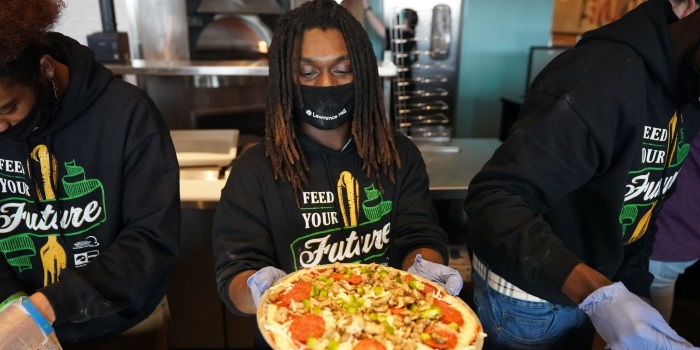Joining the MOD Squad is a leap of faith and HOPE

 HOPES provides hands-on experience through MOD employees, who tell stories about the work experience, and through Industry Skills Tours, where participants visit a location to learn what it takes to work at a restaurant.
HOPES provides hands-on experience through MOD employees, who tell stories about the work experience, and through Industry Skills Tours, where participants visit a location to learn what it takes to work at a restaurant.MOD Pizza has partnered with the National Restaurant Association Educational Foundation in its new HOPES program—Hospitality Opportunities for People (Re)Entering Society—allowing the fast-casual company to assist at-risk youth ages 18 to 24 to reset their lives and grow its employment pipeline at the same time.
Developed in concert with the Department of Corrections, community-based organizations, and state restaurant associations, HOPES is funded by the Department of Labor’s Education and Training Administration.
“We’re extremely pleased to partner with MOD Pizza,” says Foundation President Rob Gifford. “MOD is showing everyone how restaurants can successfully work with justice-involved young people and change their lives. Through HOPES, we’ll be able to create pathways to long-term success for young men and women who might have been overlooked by society.”
A holistic approach
HOPES’ goal is to reduce recidivism by connecting justice-involved youth with career opportunities in restaurants, foodservice and hospitality. It also provides access to social programs and assistance, including:
- Personalized case management
- ServSafe educational training and certification
- Legal support
- Health services
- Mental health counseling
- Educational support to obtain a high school degree
- Temporary housing assistance
- Transportation assistance
- Substance abuse counseling
“Through this platform, MOD Pizza is hiring people who might not otherwise have found employment,” says Robin Hamm, the chain’s vice president of social impact. “We want to show other businesses this really works, that it’s a viable platform, a program that can provide work and opportunity.”
The program requires each participant to work with a case manager to develop his or her individualized plan, list career goals, and identify work-readiness and industry-specific training that leads to employment. Once training is complete, each individual receives at least one industry credential and job placement.
Real-life experience
Hamm also says HOPES provides an opportunity for hands-on experience in two ways: through current MOD employee storytelling—where they explain what MOD is and talk about the restaurant industry—and through Industry Skills Tours, where participants visit a MOD location and learn what it takes to work there.
“The HOPES Industry Skills Tours are a great way for our youth to get the experience of being in a store, in the kitchen, see the front- and back-of-the-house operations, the cleanup, and everything else that goes into running a restaurant,” says Deirdra Flowers, case manager at Lawrence Hall, a community based agency for at-risk youth in Chicago.
“I can teach them from a book and share what they might need to know to get a job, like resumé building and skills like that, but I can't teach industry-specific skills.”
She says it’s often difficult for justice-involved youth to gain employment because of their records and the background checks that follow. Potential employers’ fear of liability is another reason. Through relationship building, the agency teaches employers that some of these youth are rehabilitated, come out, and change their lives. Those young adults deserve a chance, she says.
Besides Lawrence Hall, three other agencies, the Safer Foundation, also in Chicago; OAR of Richmond, Va.; and LOC Family Services in Farmville, Va.; have participated in the HOPES tours, and MOD has already hired three of these young adults—Ernest G. and Anjelo C. from Lawrence Hall, and Anthony G. from Safer.
Embracing the program
Hamm says MOD Pizza, which is also involved in other opportunity employment programs, signed on to be a part of HOPES back in 2019, but the pandemic hit a few months later and everything turned upside down.
“Thankfully, we were able to continue, and we’re really proud of that. We really want to provide opportunities to those who've been justice involved, who’ve faced barriers, but continue to evolve,” she says.
MOD has already participated in tours in Chicago and Richmond, Va., and plans more for later this year. Hamm adds that there are still challenges to overcome, things that need checking and adjustments, especially since the program is still in the pilot phase. But the rewards far outweigh those challenges.
The process requires a lot of planning, she says, including getting staff ready to share their insights with HOPES participants. MOD employees’ support and engagement has made a huge impact.
“They can see that what they’re doing is affecting individuals and entire communities,” she says. “It’s energizing them, especially now as they come out of this pandemic. They’re seeing the positive impact of helping others get to a place they never thought they’d reach.”